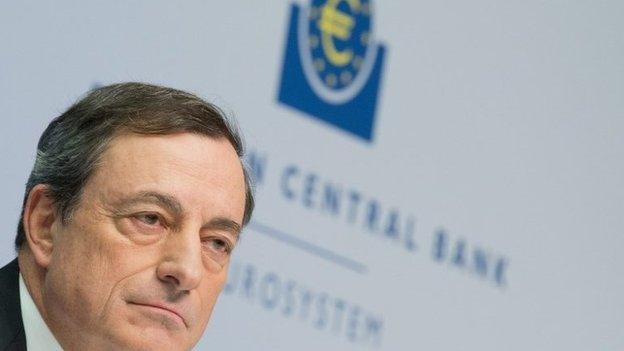QE is a eurozone palliative, not a cure
- Published
- comments

The ECJ underwrote Mario Draghi's own understanding of his mandate
The preliminary ruling from the European Court of Justice on bond purchases in a crisis by the European Central Bank - so-called Outright Monetary Transactions - probably went as well for the ECB's president, Mario Draghi, as he could have hoped.
How so? Well, the non-binding judgement said that such purchases would be legitimate, to bring down cripplingly high interest rates being paid by a member state in crisis, so long as the purchases take place on the market and not directly from the stricken government.
The judgement also said that the ECB must be allowed broad discretion in the setting and execution of monetary policy - because "courts lack the expertise and experience which the ECB has in this area".
Broadly, therefore, the ECJ underwrote Mr Draghi's own understanding of his mandate - and to a great extent slapped down the German politicians and legal experts who were challenging the ECB's right to make such bond purchases.
Economic oomph
The ruling matters for two important reasons.
First, it is not inconceivable that the eurozone could find itself, once again, in a full-throttled meltdown, if the Greek general election is seen by investors as a shortcut to Greece leaving the euro in a disorderly way.
Second, and much less hypothetically, the ruling should embolden the ECB to be more ambitious next week when embarking for the first time on the kind of quantitative easing - or purchases of government bonds - that since the 2008 financial debacle has been used as an important stimulus by the Bank of England, the US Federal Reserve and the Bank of Japan.
It is important to stress that QE and OMT (so so sorry for the ghastly shorthand) have different objectives: OMT is about stabilising money markets and bringing down borrowing costs when a country is imploding in a financial sense; QE is about trying to generate some inflation and economic oomph, when the pressures are deflationary and interest rates have already been cut to zero.
However the reasonable presumption would be that if the ECJ thinks purchases of public sector debt are acceptable for OMT, then QE is also permissible.
The big question, investors tell me, is whether the two Germans on the ECB's governing council, Jens Weidmann and Sabine Lautenschlager, will now be persuaded to vote for QE, having hitherto opposed it.
Their assent is not necessary for QE to take place. But what investors want is a big and bold commitment to QE, rather than a timid, constrained trial - and it is thought that German assent is essential for an ambitious, substantial programme of bond purchases.
Economically anaemic
All that said, the importance of QE should not be overstated. It is a palliative for a eurozone economy in which growth-crushing deflation is a clear and present danger. But unless eurozone governments seize the moment to fix their finances and improve the competitiveness of their private sectors, the region will remain economically anaemic.
Just how anaemic was highlighted overnight in new figures from the World Bank, which estimates that the eurozone grew just 0.8% in 2014, less than a third of the UK's 2.6% estimated growth, and which forecasts that GDP will grow just 1.1% this year, compared with 2.9% in Britain.
To state the obvious (as ever), QE would be more effective if it persuades investors to buy eurozone government and other bonds in scale, such that the cost of finance for all sectors were to fall.
That is much more likely not only if the ECB commits to purchase half a trillion euros or more, but also if the scheme adheres to the basic monetary union principle that all members are on the hook and in it together when it comes to monetary policy.
If, as seems highly likely, much of the bond buying will be by national central banks, rather than by the European Central Bank, that will be seen as kowtowing to German reluctance to take any financial risks in relation to the more overstretched eurozone members.
And that might well be seen not as evidence of the ECB becoming more powerful and confident but as proof that nationalist politics could yet fracture monetary union.